全国公共英语三级常见语法
PETS3 语法笔记

PETS3 语法笔记PETS 语法辅导:虚拟语气16. 虚拟语气1) 概念虚拟语气用来表示说话人的主观愿望或假想,所说的是一个条件,不一定是事实,或与事实相反。
2) 在条件句中的应用条件句可分为两类,一类为真实条件句,一类为非真实条件句。
非真实条件句表示的是假设的或实际可能性不大的情况,故采用虚拟语气。
16.1 真实条件句真实条件句用于陈述语气,假设的情况可能发生,其中 if 是如果的意思。
时态关系句型: 条件从句主句一般现在时 shall/will + 动词原形If he comes, he will bring his violin.典型例题The volleyball match will be put off if it ___.A. will rainB. rainsC. rainedD. is rained答案B。
真实条件句主句为将来时,从句用一般现在时。
注意:1) 在真实条件句中,主句不能用be going to表示将来,该用shall, will.(错) If you leave now, you are never going to regret it.(对) If you leave now, you will never regret it.2) 表示真理时,主句谓语动词便不用shall (will) +动词原形,而直接用一般现在时的动词形式。
16.2 非真实条件句1)时态:可以表示过去,现在和将来的情况。
它的基本特点是时态退后。
a. 同现在事实相反的假设。
句型 : 条件从句主句一般过去时 should( would) +动词原形If they were here, they would help you.b. 表示于过去事实相反的假设。
句型: 条件从句主句过去完成时 should(would) have+ 过去分词If she had worked harder, she would have succeeded.The rice would not have been burnt if you had been more careful.If my lawyer had been here last Saturday, he would have prevented me from going.If he had come yesterday, I should / would have told him about it.含义:He did not come yesterday, so I did not tell him about it.If he had not been ill and missed many classes, he would have made greater progress.含义: He was ill and missed many lessons, so he did not make greater progress.c. 表示对将来的假想句型: 条件从句主句一般过去时 should+ 动词原形were+ 不定式 would + 动词原形should+ 动词原形If you succeeded, everything would be all right.If you should succeed, everything would be all right.If you were to succeed, everything would be all right.16.3 混合条件句主句与从句的动作发生在不同的时间,这时主,从句谓语动词的虚拟语气形式因时间不同而不同,这叫做混合条件句。
公共英语三级语法知识汇总

公共英语三级语法知识大全一、句法分析 (1)二、词法分析 (2)三、时态 (8)四、被动语态 (11)五、情态动词 (12)六、不定式 (14)七、定语从句 (17)八、主语从句 (22)九、表语从句 (23)十、宾语从句 (23)十一、同位语从句 (24)十二、状语从句 (25)十三、虚拟语气 (41)十四、动名词 (27)十五、现在分词 (28)十六、过去分词 (31)十七、独立主格结构 (34)十八、倒装句型 (35)十九、强调句型 (36)二十、主谓一致 (37)二十一、It的用法 (39)一、句法分析1、主语:是句子要说明的人或物,可以作主语的成分有名词,主语一般在句首。
注意名词单数形式常和冠词不分家!. 1) Mr. Lee is a well-known scientist.名词作主语. 2) He reads newspapers everyday.代词作主语. 3) Two and ten is twelve.数词作主语. 4) Smoking is harmful to the health.动名词作主语. 5) To swim in that pool is a great pleasure.动词不定式作主语. 6) What we shall do next is not yet decided.从句作主语2、谓语: 说明主语的动作,状态或特征. 1) The new term begins on the 1st of September.. 2) His father is an engineer.3) She seemed happy.. 4) Li Hua showed me his album.3、宾语:指的是及物动词涉及到的人或物. 1) Wang Ling lent me a novel to read in the bus.. 2) The medicine is good for a cold.. 3) How many pieces do you want?. 4) My little sister always likes to ask questions.. 5) Would you mind coming earlier tomorrow?. 6) He asked me what I was going to do tonight4、宾语补足语:在宾语后面补充说明宾语的动作、状态、特征。
2023年大学英语三级语法知识总结汇总

三级语法考点归纳一.虚拟语气1.i.句中虚拟形式if 引导的非真实条件句(纯粹假设或发生的也许性不大):条件从句主句与现在相反did (be were) would/ should/ might/ could do与将来相反did (be were) would/ should/ might/ could do与过去相反had done would/ should/ might/ could have done例句If we left (leave) now, we should arrive in time.If they hadn’t gone on vacation, their house wouldn’t have been broken (break) into.2.原形虚拟:a.表命令、决定、规定、建议等词语之后的that-分句中,用动词原形。
suggest, demand, advise, propose, order, arrange, insist, command, require, request, desire …… that +(should) do例如He suggested that we should leave early.My suggestion is that we should tell him.b.I.i.(was.形容词/名词tha.….(should.do/例如It is absolutely essential that all the facts be examined first.3.一些句型中的虚拟形式:1.It’.(high.about.th.first.etc..tim.(that.…动词过去时.例.It’.tim.w.left..例.I.i.tim.w.wen.t.bed.2 would rather/sooner 宁愿as if/ though 仿佛would rather/sooner 谓语用过去时与现在或者将来相反as if/ though 谓语用过去完毕时与过去相反4.练习1..______.tr.i.agai.i.I_______you.A.will.a......B.should.a....C.would.wer...D.would.ha.been2.I.i.______.no.fo.th.water.th.plant._______live.A.were.woul.no..B.is.coul.no...C.were.coul...D.did.coul.not3.I.. ______.tha.chanc.t.sho.m.ability.._______th.presiden.o.thi.school.A.hav.no.had.coul.no.become ..B.ha.no.had.woul.no.hav.becom.C.di.no.have.coul.no.become ..D.doesn’.have.wil.no.become4.H.______.b.tha.burgla.i.yo.______.t.sav.him.A.migh.hav.bee.killed.hadn’.com...B.wil.b.killed.didn’.comeC.ma.b.killed.did’.com.......D.coul.b.killed.haven’.come5.I.i._______fo.you.help.._______tha.har.tim.wit.s.littl.money.A.wer.not.woul.no.spen........B.i.not.ca.no.spendC.ha.no.been.woul.no.hav.spen....D.hav.no.been.wil.no.spend6.Wher.______.yo.g.i.wa._______?A.will.break.ou............B.do.wil.brea.outC.would.wer.t.brea.ou........D.will.i.t.brea.out7.Sh.wishe.sh.______.tha.humiliatin.thing.A.doesn’.d....B.didn’.d.....C.haven’.don..D.hadn’.done8.Th.chairma.suggeste.tha.th.meetin.______.pu.off.A.ca.b.....B.b......C.i.......D.wil.be9.I.i.vita.tha.h.______.immediately.A.shoul.g...B.mus.g....C.goe......D.wen.10.I.i.tim.w._______d.ou.homework.A.begi.t....B.ca.begi.t..C.bega.t....D.wil.begi.to答案:1.选C。
公共英语三级考试语法要点解析
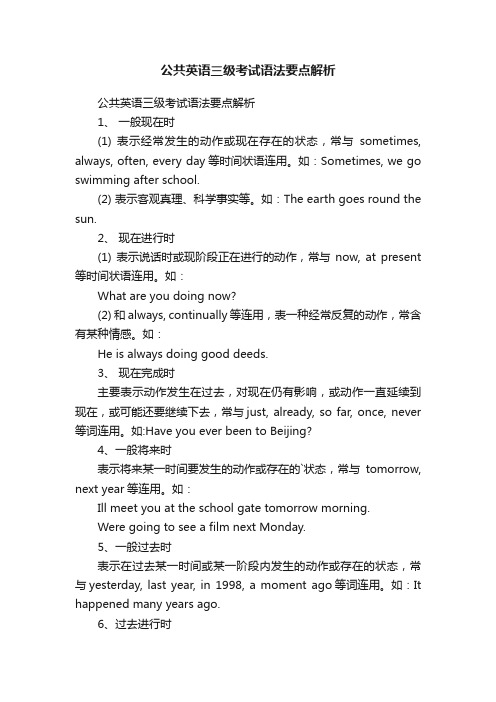
公共英语三级考试语法要点解析公共英语三级考试语法要点解析1、一般现在时(1) 表示经常发生的动作或现在存在的状态,常与sometimes, always, often, every day等时间状语连用。
如:Sometimes, we go swimming after school.(2) 表示客观真理、科学事实等。
如:The earth goes round the sun.2、现在进行时(1) 表示说话时或现阶段正在进行的动作,常与now, at present 等时间状语连用。
如:What are you doing now?(2) 和always, continually等连用,表一种经常反复的动作,常含有某种情感。
如:He is always doing good deeds.3、现在完成时主要表示动作发生在过去,对现在仍有影响,或动作一直延续到现在,或可能还要继续下去,常与just, already, so far, once, never 等词连用。
如:Have you ever been to Beijing?4、一般将来时表示将来某一时间要发生的动作或存在的`状态,常与tomorrow, next year等连用。
如:Ill meet you at the school gate tomorrow morning.Were going to see a film next Monday.5、一般过去时表示在过去某一时间或某一阶段内发生的动作或存在的状态,常与yesterday, last year, in 1998, a moment ago等词连用。
如:It happened many years ago.6、过去进行时表示过去某一时刻或某一时期正在发生的动作。
如:What were you doing this time yesterday?7、过去完成时表示在过去某一时间或动作之前已经发生或完成了的动作。
公共英语三级语法知识汇总

公共英语三级语法知识大全一、句法分析 (1)二、词法分析 (2)三、时态 (8)四、被动语态 (11)五、情态动词 (12)六、不定式 (14)七、定语从句 (17)八、主语从句 (22)九、表语从句 (23)十、宾语从句 (23)十一、同位语从句 (24)十二、状语从句 (25)十三、虚拟语气 (41)十四、动名词 (27)十五、现在分词 (28)十六、过去分词 (31)十七、独立主格结构 (34)十八、倒装句型 (35)十九、强调句型 (36)二十、主谓一致 (37)二十一、It的用法 (39)一、句法分析1、主语:是句子要说明的人或物,可以作主语的成分有名词,主语一般在句首。
注意名词单数形式常和冠词不分家!. 1) Mr. Lee is a well-known scientist.名词作主语. 2) He reads newspapers everyday.代词作主语. 3) Two and ten is twelve.数词作主语. 4) Smoking is harmful to the health.动名词作主语. 5) To swim in that pool is a great pleasure.动词不定式作主语. 6) What we shall do next is not yet decided.从句作主语2、谓语: 说明主语的动作,状态或特征. 1) The new term begins on the 1st of September.. 2) His father is an engineer.3) She seemed happy.. 4) Li Hua showed me his album.3、宾语:指的是及物动词涉及到的人或物. 1) Wang Ling lent me a novel to read in the bus.. 2) The medicine is good for a cold.. 3) How many pieces do you want?. 4) My little sister always likes to ask questions.. 5) Would you mind coming earlier tomorrow?. 6) He asked me what I was going to do tonight4、宾语补足语:在宾语后面补充说明宾语的动作、状态、特征。
公共英语三级主要语法点

Dear同学们,以下是公共英语三级的主要九个语法点。
希望同学们有时间看看。
第一,虚拟语气。
第二,定语从句。
第三,反意疑问句。
第四,倒装句。
第五,主谓一致。
第六,强调句。
第七,连词的辨析。
第八,省略句。
第九,现在分词作状语。
第一,虚拟语气。
它主要可分为以下情况:A,表建议,要求,命令的动词,及与其相关的名词、形容词或分词,后面的从句中都要用should+动词原形作谓语,should可省略。
B,某些特殊的形容词,后面常跟虚拟语气。
这一点要尤其注意。
C,wish后表示与现实相反的愿望时要用虚拟语气。
D,would rather后若加从句则要用过去式表示虚拟语气,也可以直接加do sth宁愿做…。
E,If引导的条件状语中,表示与现在情况相反的假设,表示与过去情况相反的假设时。
虚拟语气这个考点在近两年当中出现的考分这两年稍微偏高,这一点尤其大家要格外的关注一些。
第二,定语从句。
这次考试对定语从句的考察是重点考察关系词选择和非限定性定语从句。
关系词的选择关键要从其在从句中担任着的成分决定的,而不是在主句中的。
非限定性定语从句通常由逗号与修饰的名词相隔开,而且只能由which,who,whom,whose引导,其中which既可以指物,也可以指前面一整句话,这一点大家一定要注意。
另外介词和上面的关键词连用构成符合关系词的情况也很多。
第三,反意疑问句。
可以有两点,句子本身含有否定意义的时候,比如seldom后面用肯定形式的反问。
第二,考察祈使句的反问,对陈述部分是肯定句的祈使句。
第三,I think,I believe,I suppose等表示主观看法的句子,其反意疑问句由后面的宾语从句相对应。
第四,倒装句。
倒装句一共有三项应该注意:A,only后面加状语,并放于句首时,句子用倒装;而当其修饰其它成分时不倒装。
B,表示否定意义的副词或短语,如seldom,never,rarely,in no time。
C,注意Hardly/scarcely/barely had sb done…when这一句型,表示一——就…(as soon as后不加倒装)第五,主谓一致。
全国英语等级考试pets3三级常见语法解析
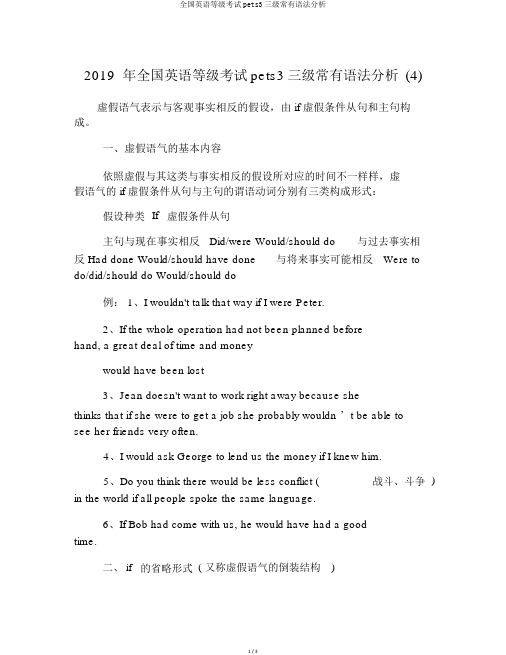
2019 年全国英语等级考试 pets3三级常有语法分析(4)虚假语气表示与客观事实相反的假设,由 if 虚假条件从句和主句构成。
一、虚假语气的基本内容依照虚假与其这类与事实相反的假设所对应的时间不一样样,虚假语气的 if 虚假条件从句与主句的谓语动词分别有三类构成形式:假设种类If 虚假条件从句主句与现在事实相反Did/were Would/should do与过去事实相反 Had done Would/should have done与将来事实可能相反Were to do/did/should do Would/should do例: 1、I wouldn't talk that way if I were Peter.2、If the whole operation had not been planned beforehand, a great deal of time and moneywould have been lost3、Jean doesn't want to work right away because shethinks that if she were to get a job she probably wouldn ’t be able tosee her friends very often.4、I would ask George to lend us the money if I knew him.5、Do you think there would be less conflict ( 战斗、斗争) in the world if all people spoke the same language.6、If Bob had come with us, he would have had a goodtime.二、 if 的省略形式( 又称虚假语气的倒装结构)在if 虚假条件从句中,若是谓语部分包含were,should ,had等词,则能够把这些词放到主语前,省略 if ,构成虚假语气的倒装结构。
全国公共英语三级常见语法「动词」

xx年全国公共英语三级常见语法「动词」在英语中,常见的感官动词有“五看二听一感觉”(see、watch、look、notice、observe;hear、listen to、feel),在主动
语态中用动词原形或现在分词作宾补,如see sb do/doing sth,
改为被动语态时那么要加to,如sb be seen to do sth.
在英语中,常见的使役动词有make、let、have,在主动语态
中用动词原形做宾补,如make sb do sth,改为被动语态时那么要
加to,如sb be made to do sth,两种形式都表示使/让某人做某
事的意思。
例:We were made to study hardy.我们被要求努力学习。
sth need/ want/ require doing 某物需要?
(=sth need/want/require to be done)(此句式主语为物)例:My room is a mess. It needs tidying up()。
have/get sth done 请/让别人做某事(have/get后接宾语为物) 例:I have taken many photos. I‘m going to get the filmdeveloped.
例:The work must be finished before lunch. 这项工作必
须在午饭前干完。
公共英语三级pets3干货 英语语法汇总
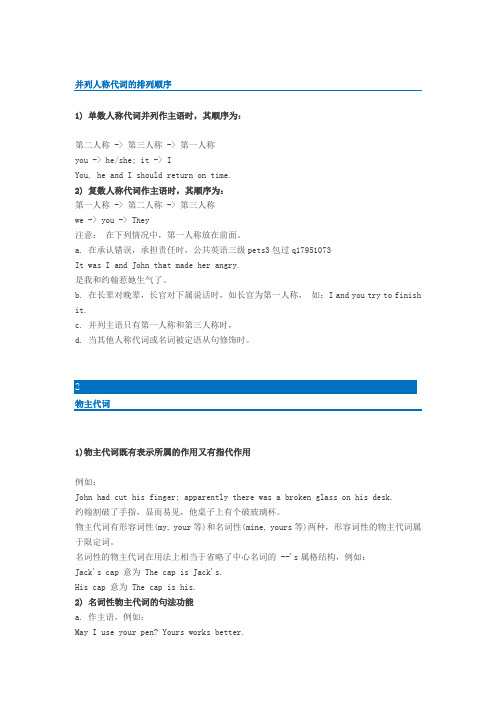
并列人称代词的排列顺序1) 单数人称代词并列作主语时,其顺序为:第二人称 -> 第三人称 -> 第一人称you -> he/she; it -> IYou, he and I should return on time.2) 复数人称代词作主语时,其顺序为:第一人称 -> 第二人称 -> 第三人称we -> you -> They注意:在下列情况中,第一人称放在前面。
a. 在承认错误,承担责任时,公共英语三级pets3包过q17951073It was I and John that made her angry.是我和约翰惹她生气了。
b. 在长辈对晚辈,长官对下属说话时,如长官为第一人称,如:I and you try to finish it.c. 并列主语只有第一人称和第三人称时,d. 当其他人称代词或名词被定语从句修饰时。
2物主代词1)物主代词既有表示所属的作用又有指代作用例如:John had cut his finger; apparently there was a broken glass on his desk.约翰割破了手指,显而易见,他桌子上有个破玻璃杯。
物主代词有形容词性(my, your等)和名词性(mine, yours等)两种,形容词性的物主代词属于限定词。
名词性的物主代词在用法上相当于省略了中心名词的 --'s属格结构,例如:Jack's cap 意为 The cap is Jack's.His cap 意为 The cap is his.2) 名词性物主代词的句法功能a. 作主语,例如:May I use your pen? Yours works better.我可以用一用你的钢笔吗? 你的比我的好用。
b. 作宾语,例如:I love my motherland as much as you love yours.我爱我的祖国就像你爱你的祖国一样深。
公共英语等级考试(PETS)3级常用句型汇总
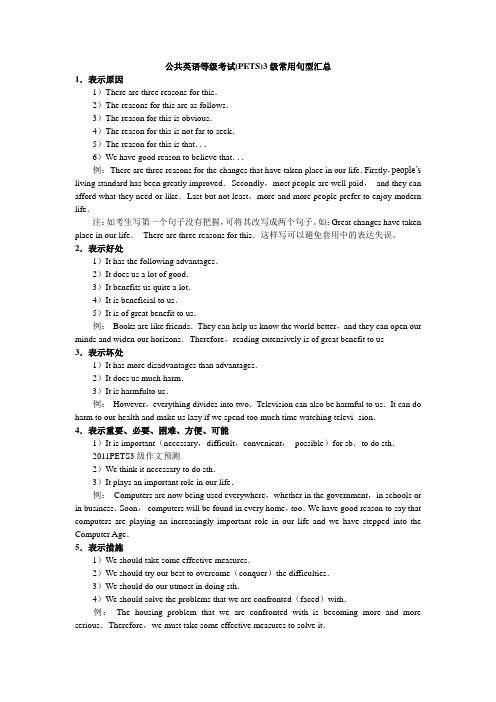
公共英语等级考试(PETS)3级常用句型汇总1.表示原因1)There are three reasons for this.2)The reasons for this are as follows.3)The reason for this is obvious.4)The reason for this is not far to seek.5)The reason for this is that...6)We have good reason to believe that...例:There are three reasons for the changes that have taken place in our life.Firstly,people’s living standard has been greatly improved.Secondly,most people are well paid,and they can afford what they need or like.Last but not least,more and more people prefer to enjoy modern life.注:如考生写第一个句子没有把握,可将其改写成两个句子。
如:Great changes have taken place in our life.There are three reasons for this.这样写可以避免套用中的表达失误。
2.表示好处1)It has the following advantages.2)It does us a lot of good.3)It benefits us quite a lot.4)It is beneficial to us.5)It is of great benefit to us.例:Books are like friends.They can help us know the world better,and they can open our minds and widen our horizons.Therefore,reading extensively is of great benefit to us3.表示坏处1)It has more disadvantages than advantages.2)It does us much harm.3)It is harmfulto us.例:However,everything divides into two.Television can also be harmful to us.It can do harm to our health and make us lazy if we spend too much time watching televi- sion.4.表示重要、必要、困难、方便、可能1)It is important(necessary,difficult,convenient,possible)for sb.to do sth.2011PETS3级作文预测2)We think it necessary to do sth.3)It plays an important role in our life.例:Computers are now being used everywhere,whether in the government,in schools or in business.Soon,computers will be found in every home,too.We have good reason to say that computers are playing an increasingly important role in our life and we have stepped into the Computer Age.5.表示措施1)We should take some effective measures.2)We should try our best to overcome(conquer)the difficulties.3)We should do our utmost in doing sth.4)We should solve the problems that we are confronted(faced)with.例:The housing problem that we are confronted with is becoming more and more serious.Therefore,we must take some effective measures to solve it.6.表示变化1)Some changes have taken place in the past five years.2)A great change will certainly be produced in the world's communications.3)The computer has brought about(导致)many changes in education.例:Some changes have taken place in people's diet in the past five years.The major reasons for these changes are not far to seek.Nowadays,more and more people are switching from grain to meat for protein,and from fruit and vegetable to milk for vitamins7.表示事实、现状1)We cannot ignore the fact that...2)No one can deny the fact that...3)There is no denying the fact that...4)This is a phenomenon that many people are interested in.5)However,that's not the case.例:We cannot ignore the fact that industrialization brings with it the problems of pollution.To solve these problems,we can start by educating the public about the hazards(危害)of pollution.The government on its part should also design stricter laws to promote a cleaner environment8.表示比较1)Compared with A,B...2)I prefer to read rather than watch TV.3)There is a striking contrast between them.例:Compared with cars,bicycles have several advantages besides being affordable.Firstly,they do not consume natural resources of petrol(石油).Secondly,they do not cause the pollution problem.Last but not least,they contribute to people's health by giving them due physical exercise.9.表示数量1)It has increased(decreased)from...to...2)The population in this city has now increased (decreased)to 800,000.3)The output of July in this factory increased by 15%compared with that of January.例:With the improvement of the living standard,the proportion(比例)of people's income spent on food has decreased while that spent on education has increased.再如:From the graph listed above,itcan be seen that student use of computers has increased from an average of less than two hours per week in 1990 to 20 hours in 2000.注:"From the graph listed above,it can be seen that"见句式12。
公共英语三级知识点汇总
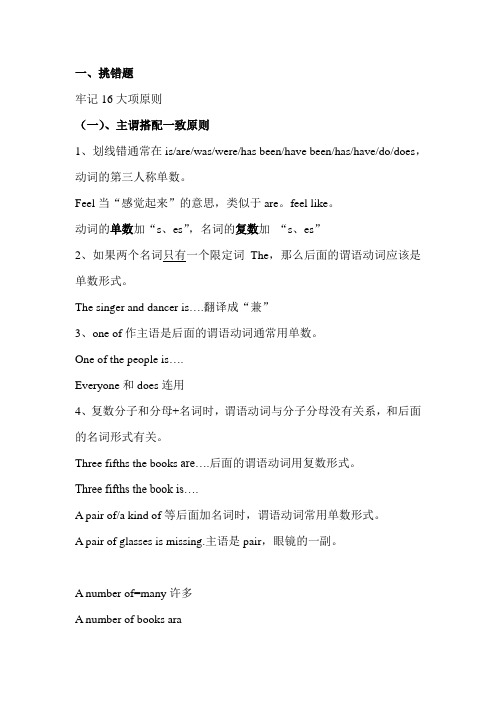
一、挑错题牢记16大项原则(一)、主谓搭配一致原则1、划线错通常在is/are/was/were/has been/have been/has/have/do/does,动词的第三人称单数。
Feel当“感觉起来”的意思,类似于are。
feel like。
动词的单数加“s、es”,名词的复数加“s、es”2、如果两个名词只有一个限定词The,那么后面的谓语动词应该是单数形式。
The singer and dancer is….翻译成“兼”3、one of作主语是后面的谓语动词通常用单数。
One of the people is….Everyone和does连用4、复数分子和分母+名词时,谓语动词与分子分母没有关系,和后面的名词形式有关。
Three fifths the books are….后面的谓语动词用复数形式。
Three fifths the book is….A pair of/a kind of等后面加名词时,谓语动词常用单数形式。
A pair of glasses is missing.主语是pair,眼镜的一副。
A number of=many许多A number of books araThe number of books isThe number of….的数量5、A as well as B 主语是A6、倒装+主谓搭配一致原则(二)、强调原则1、It is/was……thatW (which/what/whose/where/when….)给括号里面的就是错误的。
(三)、倒装原则Only/never/not /neither/so/…..+谓语动词,紧跟的动词基本都是错误的。
At on timeunder no circumstancesby no meansat no time =neverat no reteon no account含not 的介词短语in no time=soonIn no time can he admit his mistake.应用成at no time.Only+状语(状语从句)是主句要倒装的。
全国公共英语三级常见语法

第一节动词的时态一、一般现在时:1、由when、as soon as、the minute、the moment、till、until等引起的时间状语从句,以及由if、unless、provided that等引起的条件状语从句常常用一般现在时态表示将来的动作,而主句则用一般将来时态。
例:They will go home for winter vocation as soon as they finish their exams。
2、当表示普遍的真理或者众所周知的客观事实,常常用一般现在时态。
例:The earth is round。
地球是圆的.二、一般过去时:区分三个短语的用法:1、used to do sth:过去常常做某事。
2、be/get used to doing sth:习惯做某事。
3、be used to do sth:被用于做某事.三、一般将来时:1、be to+动词原形:表示安排或计划好了的动作。
例:The Third-Ring Road is to be open to traffic before National Day.2、be about to+动词原形:表示即将发生的动作。
例:The lecture is about to begin。
讲座即将开始。
3、一些表示动作趋势,如开始、终结,以及一些表示动作方向,如往来的动词,常常用现在进行时态表示按照安排将于将来发生的事情,这类动词常见的有如:start,go,leave,come,arrive等.例:We are leaving for Beijing tomorrow. 我们明天动身去北京。
四、进行时态:重点区分when和while引起的时间状语的用法。
When表示时间上的点,在考试中其引导的时间状语从句多翻译为“这时?”,主句多用进行时态;while引导的时间状语从句多翻译为“正当……时”,该从句用进行时态. 例:One of the guards was sleeping when the general came in, which made him very angry。
公共英语三级语法大总结
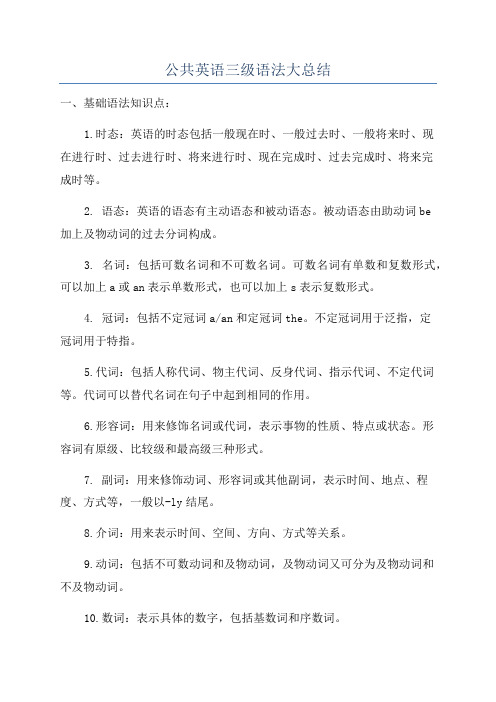
公共英语三级语法大总结一、基础语法知识点:1.时态:英语的时态包括一般现在时、一般过去时、一般将来时、现在进行时、过去进行时、将来进行时、现在完成时、过去完成时、将来完成时等。
2. 语态:英语的语态有主动语态和被动语态。
被动语态由助动词be加上及物动词的过去分词构成。
3. 名词:包括可数名词和不可数名词。
可数名词有单数和复数形式,可以加上a或an表示单数形式,也可以加上s表示复数形式。
4. 冠词:包括不定冠词a/an和定冠词the。
不定冠词用于泛指,定冠词用于特指。
5.代词:包括人称代词、物主代词、反身代词、指示代词、不定代词等。
代词可以替代名词在句子中起到相同的作用。
6.形容词:用来修饰名词或代词,表示事物的性质、特点或状态。
形容词有原级、比较级和最高级三种形式。
7. 副词:用来修饰动词、形容词或其他副词,表示时间、地点、程度、方式等,一般以-ly结尾。
8.介词:用来表示时间、空间、方向、方式等关系。
9.动词:包括不可数动词和及物动词,及物动词又可分为及物动词和不及物动词。
10.数词:表示具体的数字,包括基数词和序数词。
11.简单句:由主语和谓语构成,可以包含宾语、表语、宾语补足语等。
12.并列句:由两个或多个简单句用并列连词连接而成,表示并列关系。
13.复合句:包括主从复合句和连接复合句。
主从复合句由一个主句和一个或多个从句构成,连接复合句由两个或多个从句构成。
14.修饰语从句:修饰一个名词或代词的从句,通常由关系代词或关系副词引导。
15.定语从句:修饰一个名词或代词的从句,通常由关系代词或关系副词引导。
16.状语从句:修饰动词、形容词或副词的从句,通常由连词或连词短语引导。
17.祈使句:表示请求、命令、建议等,一般不指明主语,用动词原形开头。
18.感叹句:表示惊讶、高兴、忧虑等感叹的句子。
19.反意疑问句:用来表示征求对方的同意或确认,一般由一个陈述句和相应的疑问句组成。
二、高级语法结构:1.过去完成时:表示在过去一些时间点之前已经完成的动作或事件。
公共英语三级语法综述
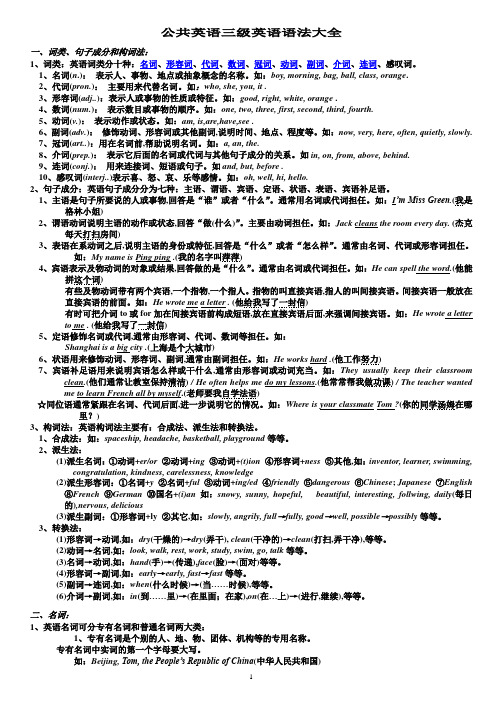
公共英语三级英语语法大全一、词类、句子成分和构词法:1、词类:英语词类分十种:名词、形容词、代词、数词、冠词、动词、副词、介词、连词、感叹词。
1、名词(n.):表示人、事物、地点或抽象概念的名称。
如:boy, morning, bag, ball, class, orange.2、代词(pron.):主要用来代替名词。
如:who, she, you, it .3、形容词(adj..):表示人或事物的性质或特征。
如:good, right, white, orange .4、数词(num.):表示数目或事物的顺序。
如:one, two, three, first, second, third, fourth.5、动词(v.):表示动作或状态。
如:am, is,are,have,see .6、副词(adv.):修饰动词、形容词或其他副词,说明时间、地点、程度等。
如:now, very, here, often, quietly, slowly.7、冠词(art..):用在名词前,帮助说明名词。
如:a, an, the.8、介词(prep.):表示它后面的名词或代词与其他句子成分的关系。
如in, on, from, above, behind.9、连词(conj.):用来连接词、短语或句子。
如and, but, before .10、感叹词(interj..)表示喜、怒、哀、乐等感情。
如:oh, well, hi, hello.2、句子成分:英语句子成分分为七种:主语、谓语、宾语、定语、状语、表语、宾语补足语。
1、主语是句子所要说的人或事物,回答是“谁”或者“什么”。
通常用名词或代词担任。
如:I’m Miss Green.(我是格林小姐)2、谓语动词说明主语的动作或状态,回答“做(什么)”。
主要由动词担任。
如:Jack cleans the room every day. (杰克每天打扫房间)3、表语在系动词之后,说明主语的身份或特征,回答是“什么”或者“怎么样”。
公共英语三级知识点
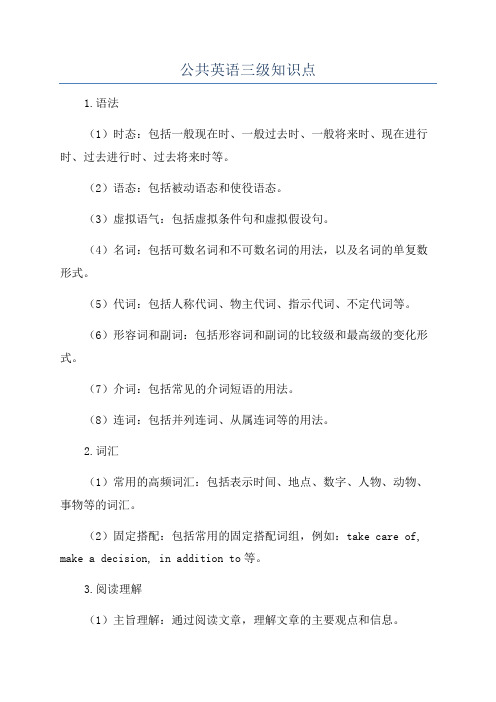
公共英语三级知识点
1.语法
(1)时态:包括一般现在时、一般过去时、一般将来时、现在进行时、过去进行时、过去将来时等。
(2)语态:包括被动语态和使役语态。
(3)虚拟语气:包括虚拟条件句和虚拟假设句。
(4)名词:包括可数名词和不可数名词的用法,以及名词的单复数形式。
(5)代词:包括人称代词、物主代词、指示代词、不定代词等。
(6)形容词和副词:包括形容词和副词的比较级和最高级的变化形式。
(7)介词:包括常见的介词短语的用法。
(8)连词:包括并列连词、从属连词等的用法。
2.词汇
(1)常用的高频词汇:包括表示时间、地点、数字、人物、动物、事物等的词汇。
(2)固定搭配:包括常用的固定搭配词组,例如:take care of, make a decision, in addition to等。
3.阅读理解
(1)主旨理解:通过阅读文章,理解文章的主要观点和信息。
(2)细节理解:通过阅读文章,寻找并理解文章中的细节信息。
(3)推理判断:通过阅读文章,运用逻辑思维推理出正确的答案。
(4)词义猜测:根据文章上下文,推测出词语的含义。
4.写作
(1)个人简介:写作自我介绍,包括姓名、年龄、职业、爱好等。
(2)描写事物:写作对人、地点、事物的描写,包括外貌特征、性格特点、场所环境等。
(3)写作推荐信:写作推荐信,包括介绍被推荐人的基本情况、能力和优势等。
公共三级英语语法

语法:情态动词情态动词是表示有能力、义务、必要、猜测等说话人的语气或情态等的词类。
所表示的情态包括命令、请求、愿望、拒绝、可能、需要、敢于等。
情态动词本身有一定的意义,但不完全,不能单独作谓语,只能和不带to的动词不定式(ought等除外)一起构成复合谓语。
情态动词有:can/could, may/might, shall/should, ought/ought, will/would, must/must、need/needed, dare/dared, have(has) to/had to, used to等。
三级统考中,重点不是考试情态动词+原形动词,重点是考试下面四种比较复杂结构:1、must have done表示对过去的动作比较有把握的猜测。
如The road is wet.It must have rained last night.地是湿的,昨晚一定是下雨了。
另外,may have done 也表示对过去事实的猜测,但可能性比较小。
如He isn’t here yet.He may have forgotten about the meeting.他还没来,可能是忘了这次会议了。
2、should (not) have done / ought (not) have done表示过去应当做的动作由于某种原因没有做到,含有责备之意,其中should (not) have done语气较重一些。
如:You should have got up earlier.你本来应该早起的。
She ought to have seen a doctor about her headache a week ago.她本应一周前去看头痛病的。
3、would have done也表示过去没有实现的动作,与should have done 相比,would have done不可以单独使用,必须和虚拟语气中的条件从句连用;再者should have done有批评意味,而would have done没有批评意味。
- 1、下载文档前请自行甄别文档内容的完整性,平台不提供额外的编辑、内容补充、找答案等附加服务。
- 2、"仅部分预览"的文档,不可在线预览部分如存在完整性等问题,可反馈申请退款(可完整预览的文档不适用该条件!)。
- 3、如文档侵犯您的权益,请联系客服反馈,我们会尽快为您处理(人工客服工作时间:9:00-18:30)。
;第一节动词的时态一、一般现在时:1、由when、as soon as、the minute、the moment、till、until等引起的时间状语从句,以及由if、unless、provided that等引起的条件状语从句常常用一般现在时态表示将来的动作,而主句则用一般将来时态。
例:They will go home for winter vocation as soon as they finish their exams.2、当表示普遍的真理或者众所周知的客观事实,常常用一般现在时态。
例:The earth is round. 地球是圆的。
二、一般过去时:区分三个短语的用法:1、used to do sth:过去常常做某事。
2、be/get used to doing sth:习惯做某事。
,3、be used to do sth:被用于做某事。
三、一般将来时:1、be to+动词原形:表示安排或计划好了的动作。
例:The Third-Ring Road is to be open to traffic before National Day.2、be about to+动词原形:表示即将发生的动作。
例:The lecture is about to begin.讲座即将开始。
3、一些表示动作趋势,如开始、终结,以及一些表示动作方向,如往来的动词,常常用现在进行时态表示按照安排将于将来发生的事情,这类动词常见的有如:start,go,leave,come,arrive等。
例:We are leaving for Beijing tomorrow. 我们明天动身去北京。
四、进行时态:重点区分when和while引起的时间状语的用法。
When表示时间上的点,在考试中其引导的时间状语从句多翻译为“这时”,主句多用进行时态;while引导的时间状语从句多翻译为“正当……时”,该从句用进行时态。
例:One of the guards was sleeping when the general came in, which made him very angry.'I fell and hurt myself while I was playing tennis.五、现在完成时:重点区分have (has) been to:某人去过某地,表示一种经历,强调状态,可以和once,twice,often,never,ever连用;Have (has) gone to:某人在去某地的途中或已在某地,强调动作。
此句型不能与上述时间状语连用。
例:He has gone to America.他已经去了美国。
He has been to America twice.他去过美国两次。
六、过去完成时:1、强调一个动作发生在另外一个过去的动作之前时,用过去完成时。
2、It was the first/second/last time that 在该句型,that从句用过去完成时态。
七、将来完成时:)常常标志性地由by、by the time、by the end of引起一个表示将来时间段的时间状语,主句用将来完成时态。
第二节感官动词、使役动词的用法及英语中常考的两个句式结构一、感官动词的用法及其被动语态:在英语中,常见的感官动词有“五看二听一感觉”(see、watch、look、notice、observe;hear、listen to、feel),在主动语态中用动词原形或现在分词作宾补,如see sb do/doing sth,改为被动语态时则要加to,如sb be seen to do sth.二、使役动词的用法及其被动语态:在英语中,常见的使役动词有make、let、have,在主动语态中用动词原形做宾补,如make sb do sth,改为被动语态时则要加to,如sb be made to do sth,两种形式都表示使/让某人做某事的意思。
例:We were made to study hardy.我们被要求努力学习。
三、英语中常考的句式结构一:sth need/ want/ require doing 某物需要(=sthneed/want/require to be done)(此句式主语为物)例:My room is a mess. It needs tidying up (整理)。
四、英语中常考的句式结构二:have/get sth done 请/让别人做某事(have/get后接宾语为物)例:I have taken many photos. I‘m going to get the filmdeveloped. 五、情态动词的被动语态,其构成为:情态动词+be+过去动词。
例:The work must be finished before lunch. 这项工作必须在午饭前干完。
第三节情态动词[常见的情态动词有can、could;may、might;must、need;should;ought to,对于情态动词常考其两方面的内容,一是情态动词用于推测句型,二是情态动词用于虚拟语气(该部分的讲解放在虚拟语气)一、情态动词用于对现在内容推测的常见句型有:1、Can/may do sth:表示对现在内容的可能性的推测;2、Must do sth:表示对现在内容的肯定性的推测。
二、情态动词用于对过去内容推荐的常见句型:1、can/may have done sth:表示对过去内容的可能性;2、must have done sth:表示对过去内容的肯定性的推测。
例:1、Mr Green must have failed to receive my letter, otherwise he would have replied.。
2、I believe he must have had an accident, otherwise he would have arrived on time.第四节虚拟语气虚拟语气表示与客观事实相反的假设,由if虚拟条件从句和主句构成。
一、虚拟语气的基本内容根据虚拟与其这种与事实相反的假设所对应的时间不同,虚拟语气的if虚拟条件从句与主句的谓语动词分别有三类构成形式:假设类型If虚拟条件从句主句与现在事实相反 Did/were Would/should do 与过去事实相反 Had done Would/should have done 与将来事实可能相反 Were to do/did/should do Would/should do例:1、I wouldn't talk that way if I were Peter.》2、If the whole operation had not been planned before hand, a great deal of time and moneywould have been lost3、Jean doesn't want to work right away because she thinks that if she were to get a job she prob ably wouldn’t be able to see her friends very often.4、I would ask George to lend us the money if I knew him.5、Do you think there would be less conflict (战斗、斗争) in the world if all people spoke the same language.6、If Bob had come with us, he would have had a good time.二、if的省略形式(又称虚拟语气的倒装结构)在if虚拟条件从句中,如果谓语部分包含were,should,had等词,则可以把这些词放到主语前,省略if,构成虚拟语气的倒装结构。
\三、主句与从句时间不一致时虚拟语气的构成当虚拟语气的if虚拟条件从句和主句的动作发生的时间不一致时,要根据各自表示的时间采用对应的虚拟语气的构成形式。
例:1、If I had attended the meeting yesterday, I would know what happened now.2、If you had taken our advice at that time, you would not be in trouble now.四、主观倾向性动词引导的虚拟语气的构成在英语中存在一些动词,表示建议、命令、要求等主观的倾向,由这些动词引导的that宾语从句中,从句的谓语动词要用should+动词原形,should可以省略。
这类常见的主观倾向性动词有“一坚持、二命令、三建议、五要求”,分别是:一坚持:insist 二命令:order、command 三建议:suggest、advise(n advice)、propose(提议、建议)五要求:ask、demand、require、request、desire例:1、The doctor advised that Mr. Malan have an operation right away so as to save his life.;2、His mother insisted that he put on the coat when going out. 同时,如果在题干中出现上面这些主观倾向性动词的名词和形容词形式,题干中从句部分的谓语动词也要用should+动词原形,should可以省略。
考试中常见的词汇有:order,command,suggestion,advice,proposal,demand,request,desire,advisable,desirable.五、wish that和if only引导的虚拟语气的构成Wish that引导的宾语从句和if only引起的感叹句都用虚拟语气来表示一种没有实现或无法实现的愿望,其中wish that句型往往翻译为:多么希望;if only表示的愿望较wish that更强烈,常翻译为但愿;要是就好了。
两者的用法基本相同。
两者的用法是:1、当表示与现在的事实相反的一种愿望时,wish that引导的宾语从句和if only引起的感叹句中谓语动词采用的形式是:did/were;2、当表示与过去的事实相反的一种愿望时,wish that引导的宾语从句和if only引起的感叹句中谓语动词采用的形式是:had done;3、当表示未来一时很难实现的一种愿望时,wish that引导的宾语从句和if only引起的感叹句中谓语动词采用的形式是:would do.六、would rather引导的虚拟语气的构成Would rather的意思是“宁愿、宁可”其引导的宾语从句(一般省去that)通常用虚拟语气表示一种与事实相反的假设。
